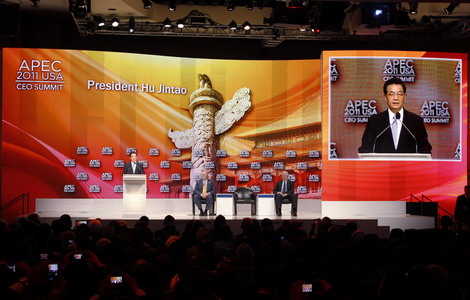'Bigger say for emerging markets'
Updated: 2011-11-14 08:00
By Wu Jiao (China Daily)
|
|||||||||||
|
 Attendees to the APEC CEO summit take photos of President Hu Jintao, as he addressed the summit in Honolulu, Hawaii, on Saturday. [Photo / Reuters] |
HONOLULU - President Hu Jintao has called for emerging markets and developing countries to have a greater say in global economic governance.
Addressing top executives at the Asia-Pacific Economic Cooperation (APEC) forum CEO summit in Honolulu on Saturday, he said changes are taking place in global economic governance, but they are not keeping up with changes in global economics.
Emerging markets and developing countries are carrying greater weight and are playing a bigger role in global economic governance, Hu said.
"New mechanisms for global economic governance should reflect changes on the world stage," Hu said.
"They should observe the principle of mutual respect and collective decision-making and increase the representation and voice of emerging markets and developing countries."
Hu arrived in Hawaii on Thursday to attend the 19th leaders' meeting of the APEC group. He was also expected to address the leaders' meeting on Sunday.
The way the global economy is run has been increasingly questioned in recent months as the eurozone has grappled with its debt problems and the world has struggled to recover from the economic crisis. Many countries have called for structural reform, and the issue has been high on the agenda of organizations such as the United Nations, the Group of 20 and APEC.
Nassir Abdulaziz Al-Nasser, President of the UN General Assembly, said on Friday that one of the assembly's priorities during the current session is to strengthen the UN system for global governance through creative and adaptive structural changes.
"Serious concerns relating to food security and the global financial and economic crisis have exposed how fragile and fragmented global economic governance has become," he said.
Addressing the APEC CEO summit, Hu also called for an increase in regional economic integration through trade.
China supports efforts to build an Asia-Pacific free trade area based on the East Asia Free Trade Area, the Comprehensive Economic Partnership for East Asia and the Trans-Pacific Strategic Economic Partnership Agreement, he said.
"The regional multilateral trading regime has played an important role in countering the international financial crisis and opposing protectionism."
Hu, calling on all countries to make rules on multilateral trade balanced and inclusive and beneficial to everyone, said China will move faster on the idea of establishing free trade areas, and will strengthen business ties with major trading partners. It will also deepen practical cooperation with other emerging markets and developing countries, he said.
"We should vigorously promote regional and sub-regional economic cooperation and the establishment of free trade areas."
While focusing on China's plans in developing a regional economy, Hu stressed that China will "open wider to the outside world and take an active part in global economic governance and regional cooperation". He also said China will give equal weight to imports and exports and to inbound and outbound investment, and focus more on encouraging Chinese businesses to invest overseas.








